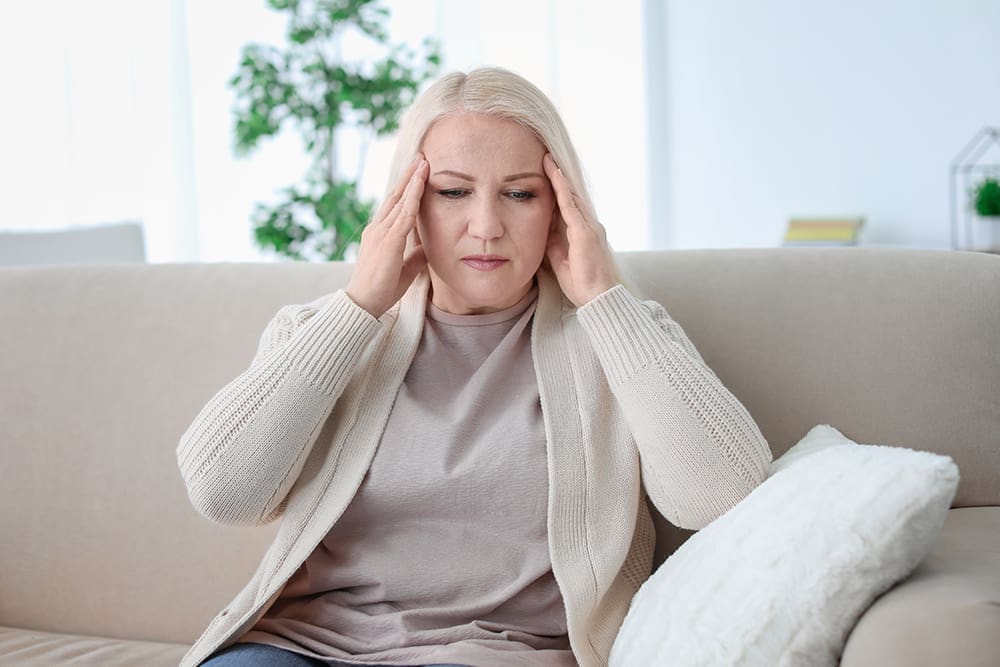Reviewed By Blake Gilliam, CRNP
Reading Time: 4 minutes
You drink the same amount, but the reaction feels totally different. A single glass might trigger flushing, headaches, or ruin your sleep for the night. That sudden sensitivity to alcohol is not random, it is linked to your hormones.
As estrogen levels drop during menopause, your body becomes more reactive. Even a small shift in hormone balance can change how alcohol affects your system. For many women, symptoms of menopause become worse with even moderate drinking.
This blog explains why menopause and alcohol intolerance often go hand in hand, what symptoms to watch for, and how to feel more in control without giving up everything you enjoy.
Table of Contents
Key Takeaway
Hormonal changes during menopause can make your body more sensitive to alcohol by slowing metabolism, affecting hydration, and amplifying common symptoms like hot flashes and poor sleep. Recognizing this link can help you adjust your habits and feel more in control.
Why Alcohol Affects You More During Menopause
Hormonal shifts change how your body processes alcohol. Estrogen and progesterone drop sharply during menopause. These hormones play a role in hydration, metabolism, and immune function, each of which affects your alcohol tolerance.
Here is how menopause can amplify the effects of alcohol:
- Slower alcohol metabolism: During menopause, lower estrogen and reduced alcohol dehydrogenase activity can slow how your body breaks down alcohol. This means alcohol stays in your system longer and may affect you more strongly than it used to.
- Shifts in body composition: During menopause, some women experience a decrease in lean muscle and an increase in body fat. Because alcohol is water-soluble and does not absorb well into fat, these changes can make alcohol more concentrated in the bloodstream and amplify its effects.
- Sleep disruption: Alcohol already impairs sleep. Combine that with menopause-related sleep disturbances, and the result can be worse fatigue and irritability the next day.
- Vasomotor symptoms: Alcohol intake can trigger hot flashes, especially red wine and spirits.
- Dehydration and flushing: Lower estrogen levels can make your blood vessels more sensitive, causing them to dilate more easily. This may lead to facial redness, headaches, or nausea after even small amounts of alcohol.
- Worsening mental health: For some, alcohol worsens brain fog, anxiety, or depression, key symptoms of menopause.
Health Considerations for Alcohol Use in Menopause
As your body changes, alcohol may affect your health differently than it used to. While an occasional drink may still fit into a balanced lifestyle, regular or excessive alcohol use during menopause can contribute to some health challenges.
Here are a few things to be aware of:
- Breast cancer risk: Some studies suggest that even moderate alcohol intake may slightly increase breast cancer risk, particularly in women with other risk factors.
- Heart health: Alcohol can raise blood pressure and triglycerides, especially when consumed in larger amounts.
- Weight gain and inflammation: Hormonal changes already make weight management harder, and alcohol can add empty calories and promote inflammation.
- Worsened menopause symptoms: Alcohol may amplify hot flashes, disrupt sleep, and increase mood swings for some women.
- Existing conditions: If you have liver issues, metabolic concerns, or hormone-sensitive conditions, alcohol may have a stronger impact now.
The takeaway: You do not necessarily need to stop drinking, but it helps to stay aware of how your body responds and adjust your habits as needed.
How to Drink Smarter During Menopause
If you notice that alcohol affects you differently now, a few adjustments may help you feel better:
- Choose simpler drinks: Clear spirits like vodka or gin often cause fewer reactions than wine or beer.
- Stay hydrated: Drink water between alcoholic beverages and before bed.
- Avoid alcohol near bedtime: This can reduce sleep disruptions and hot flashes.
- Eat beforehand: Food slows alcohol absorption and may ease stomach discomfort.
- Track your reactions: Keeping a simple log can help you notice patterns and identify your limits.
- Try a short break: A few weeks without alcohol may give you clearer insight into its impact on your mood, sleep, and energy.
Book a Consultation in Madison, AL
Menopause changes how your body responds to many things, including alcohol. But it is not just about one trigger. Sleep, mood, weight, and energy can all shift in response to hormone changes.
At Madison Integrative Medicine, we offer hormone therapy and personalized treatment plans to help you understand what is changing and what to do about it.
If your symptoms are starting to affect your quality of life, we are here to help you find a more informed and sustainable way forward.
Schedule a consultation at our wellness center in Madison, AL, call (256) 325-0955 or visit us at 1230 Slaughter Rd Suite C, Madison, AL.

